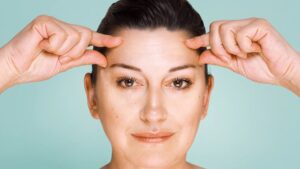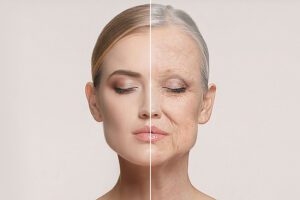Wrinkles are a natural part of aging, but many people seek ways to Reduce the Appearance of Wrinkles. While there’s no way to completely stop wrinkles from forming, several strategies backed by scientific research can help reduce their visibility. From lifestyle changes to skincare habits, incorporating these practices into your routine may help you maintain smoother, more youthful-looking skin.
1. Protect Your Skin from the Sun
Exposure to sun ultraviolet (UV) rays accelerates your skin’s aging process and contributes to the formation of wrinkles. Use a broad-spectrum SPF of 30 or greater every day to protect your skin, even on overcast days. Additionally, seek shade when the Sun is most vital, usually between 10 a.m. and 2 p.m.
2. Quit Smoking
The fibres that give your skin flexibility and strength, collagen and elastin, are harmed by Smoking. This damage leads to premature aging and wrinkles, particularly around the mouth and eyes. Quitting Smoking can help prevent further damage and improve your skin’s health and appearance.
3. Stay Hydrated
Drinking adequate water helps keep your skin hydrated, plump, and more resilient to wrinkling. While there’s no specific recommendation for how much water you should drink daily, aiming for around eight glasses or more is generally advised. However, individual hydration needs may vary based on age, activity level, and climate.
4. Follow a Healthy Diet
A diet rich in fruits, vegetables, lean proteins, and healthy fats provides essential skin health nutrients. Antioxidant-rich foods, such as berries, spinach, and nuts, help protect your skin from damage caused by free radicals and promote collagen production, reducing wrinkles’ appearance over time.

5. Use Retinoids
Retinoids, derived from vitamin A, are among the most effective ingredients for reducing wrinkles and improving skin texture. These compounds stimulate collagen production, increase cell turnover, and help fade discolouration. Over-the-counter retinol creams or prescription-strength retinoids can be incorporated into your skincare routine to target fine lines and wrinkles.
6. Moisturize Regularly
Keeping your skin hydrated with a moisturizer helps maintain its elasticity and plumpness, reducing the appearance of wrinkles. Look for moisturizers containing ingredients like hyaluronic acid serum, glycerin, and ceramides, which help attract and retain moisture in the skin. After cleansing, apply moisturizer to damp skin to seal in moisture.
7. Get Adequate Sleep
Restful sleep is necessary for skin renewal and healing. During deep sleep, the body produces collagen, repairs damaged cells, and balances hydration levels. Aim for 7-9 hours of uninterrupted sleep each night to support healthy skin and minimize the formation of wrinkles caused by sleep deprivation.
8. Manage Stress
Chronic Stress can accelerate aging by increasing inflammation and oxidative Stress in the body, leading to collagen and elastin fibers breakdown. Practice stress-reduction techniques such as meditation, deep breathing, yoga, or engaging in hobbies to promote relaxation and protect your skin from premature aging.

9. Limit Alcohol Consumption
Excessive alcohol consumption can dehydrate the skin and deprive it of essential nutrients, leading to dullness, dryness, and an increased risk of wrinkles. Limit your alcohol intake and hydrate with water or non-alcoholic beverages to maintain skin health and minimize the appearance of fine lines.
10. Consider Professional Treatments
Consider professional treatments such as laser therapy, chemical peels, microdermabrasion, or injectable fillers for more significant wrinkle reduction. These procedures can help stimulate collagen production, improve skin texture, and reduce the appearance of wrinkles, but qualified skincare professionals should perform them.
In conclusion, while wrinkles are a natural part of aging, certain lifestyle habits and skincare practices can help minimize their appearance and promote healthier, more youthful-looking skin. By protecting your skin from the Sun, adopting a healthy lifestyle, using effective skincare products, and considering professional treatments when necessary, you can maintain smoother, more radiant skin for years. Always consult a dermatologist or skin care specialist to develop a personalized anti-aging regimen tailored to your skin type and concerns.
